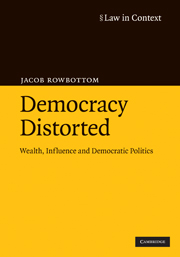Book contents
- Frontmatter
- Contents
- Preface and acknowledgements
- 1 Political equality, wealth and democracy
- 2 Freedom to speak and freedom to spend
- 3 Strategies and reforms
- 4 Access, influence and lobbying
- 5 Beyond equal votes: election campaigns and political parties
- 6 Public spaces, property and participation
- 7 The mass media: democratic dreams and private propagandists
- 8 Participation in the digital era: a new distribution?
- 9 Conclusion
- Index
Preface and acknowledgements
Published online by Cambridge University Press: 05 June 2012
- Frontmatter
- Contents
- Preface and acknowledgements
- 1 Political equality, wealth and democracy
- 2 Freedom to speak and freedom to spend
- 3 Strategies and reforms
- 4 Access, influence and lobbying
- 5 Beyond equal votes: election campaigns and political parties
- 6 Public spaces, property and participation
- 7 The mass media: democratic dreams and private propagandists
- 8 Participation in the digital era: a new distribution?
- 9 Conclusion
- Index
Summary
I first started thinking about money, politics and political equality a decade ago while working as a researcher in a senatorial campaign in the United States. It was a fascinating experience and I found much to admire about the US democratic system. Yet the vast amount of money spent in the election campaigns was striking. It is not much of an insight to say that money is important in US politics, but seeing the system in action brought the matter home to me. When I returned from the United States, there was similar talk about money and wealth being used to secure political influence in the UK, particularly in relation to some very large donations being made to political parties. Yet compared to the United States, UK politics is relatively inexpensive, and this is partly the product of the political system and its regulatory environment. The arguments advanced in this book seek to defend those features that have kept the costs of politics down, as well as propose some new strategies.
The way wealth can be used to secure political influence will depend on the particular features of the system in question. In the United States, many of the electoral battles are fought out through television advertisements. By contrast, in the UK the election campaigns and political debate tend to be conducted through the political coverage of the national media. As a result, particular attention will be given to the role of the mass media in later chapters.
- Type
- Chapter
- Information
- Democracy DistortedWealth, Influence and Democratic Politics, pp. ix - xPublisher: Cambridge University PressPrint publication year: 2010

